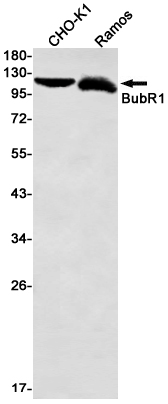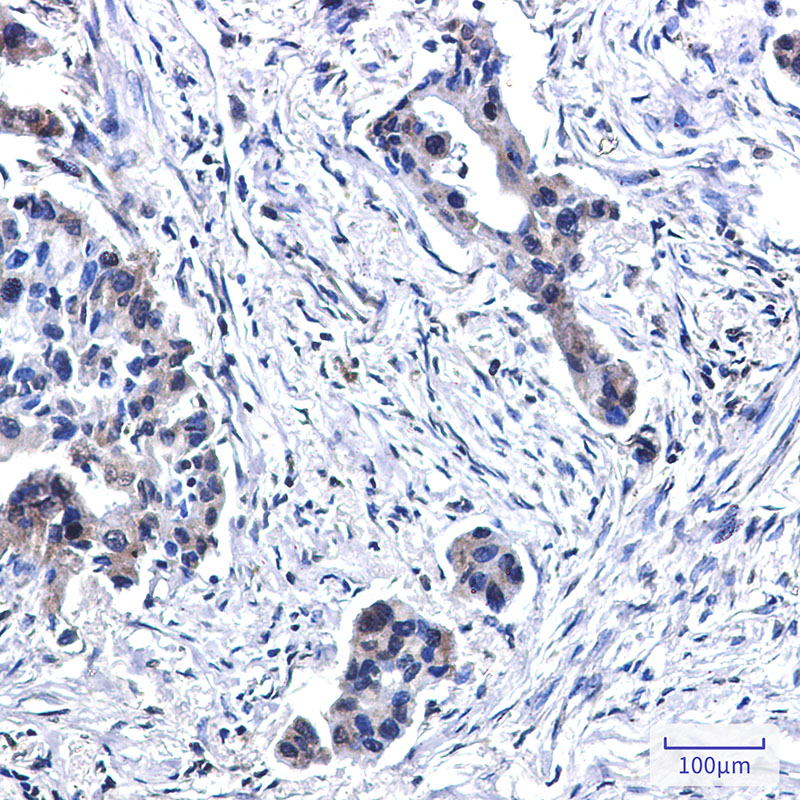

| WB | 1/500-1/1000 | Human,Hamster |
| IF | 1/20 | Human,Hamster |
| IHC | 1/50-1/100 | Human,Hamster |
| ICC | 技术咨询 | Human,Hamster |
| FCM | 咨询技术 | Human,Hamster |
| Elisa | 咨询技术 | Human,Hamster |
| Aliases | BUB1B; BUBR1; MAD3L; SSK1; Mitotic checkpoint serine/threonine-protein kinase BUB1 beta; MAD3/BUB1-related protein kinase; hBUBR1; Mitotic checkpoint kinase MAD3L; Protein SSK1 |
| Entrez GeneID | 701 |
| WB Predicted band size | Calculated MW: 120 kDa; Observed MW: 120 kDa |
| Host/Isotype | Rabbit IgG |
| Antibody Type | Primary antibody |
| Storage | Store at 4°C short term. Aliquot and store at -20°C long term. Avoid freeze/thaw cycles. |
| Species Reactivity | Human,Hamster |
| Immunogen | A synthetic peptide of human BubR1 |
| Formulation | Purified antibody in TBS with 0.05% sodium azide,0.05%BSA and 50% glycerol. |
+ +
以下是关于BUBR1抗体的3篇示例参考文献(内容为示例,非真实文献):
---
1. **文献名称**: *BUBR1 is essential for mammalian cell cycle checkpoint control*
**作者**: Lampson MA, et al.
**摘要**: 研究通过特异性BUBR1抗体揭示了该蛋白在有丝分裂检查点中的核心作用,证明其缺失导致染色体错误分离,并阐明了其在维持基因组稳定性中的功能。
2. **文献名称**: *Age-related decline of BUBR1 expression links to cellular senescence*
**作者**: Baker DJ, et al.
**摘要**: 利用BUBR1抗体在小鼠模型中检测蛋白表达水平,发现其随年龄增长显著下降,并与衰老相关的细胞周期停滞及组织功能退化密切相关。
3. **文献名称**: *BUBR1 phosphorylation status as a prognostic marker in cancer*
**作者**: Yamamoto Y, et al.
**摘要**: 通过免疫组化(BUBR1抗体)分析肿瘤样本,发现BUBR1磷酸化水平与癌症患者预后不良相关,提示其可作为潜在治疗靶点。
---
注:以上文献为虚构示例,实际引用时需查询真实数据库(如PubMed)获取准确信息。
The BUBR1 antibody is a crucial tool in studying the BUBR1 protein (also known as BUB1B), a key regulator of the spindle assembly checkpoint (SAC) during mitosis. BUBR1 ensures accurate chromosome segregation by monitoring microtubule-kinetochore attachments and delaying anaphase until all chromosomes achieve proper bipolar alignment. Dysregulation of BUBR1 is linked to chromosomal instability, aneuploidy, and cancer progression. It also plays roles in aging, meiosis, and cellular stress responses.
BUBR1 antibodies are widely used in research to detect protein expression, localization, and post-translational modifications via techniques like Western blot, immunofluorescence, and immunohistochemistry. These antibodies help investigate SAC mechanisms, mitotic errors, and correlations between BUBR1 dysfunction and diseases, including cancers (e.g., colorectal, breast) and mosaic variegated aneuploidy syndrome, a rare genetic disorder caused by BUBR1 mutations.
Studies using BUBR1 antibodies have revealed its involvement in chemotherapy resistance and senescence, making it a potential therapeutic target. Commercial antibodies vary in specificity, requiring validation for experimental conditions. Ongoing research aims to elucidate BUBR1's multifaceted roles, leveraging these antibodies to advance understanding of cell cycle regulation and disease pathogenesis.
×